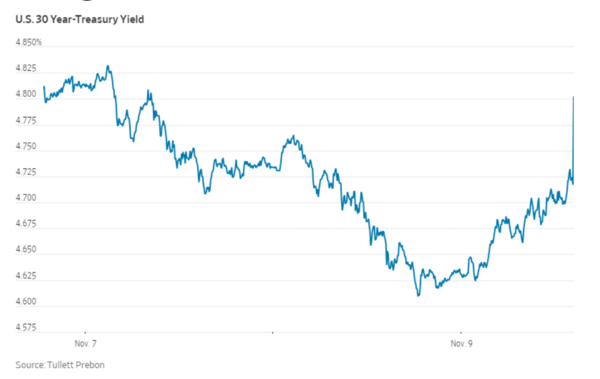US Treasury auction hits an unexpected wall
U.S. Treasury struggles to sell bonds as planned - forced to pay a higher than targeted coupon
To date, the US government has been able to operate with unpayable debt levels because investors have been willing to buy US bonds at historically low interest rates – particularly low for an issuer whose balance sheet is hopeless as is the case with the US government. During the COVID shutdowns, government bonds traded briefly with a yield below 1%.
As we detailed in our report, Once In A Generation, that moment was the classic book-end conclusion to a generational decline in rates. This generational cycle began in 1980 when rates touched 20% at a moment in time when inflation seemed unquenchable. The cycle ended when headlines made it seem as though no one was ever going to buy anything again amidst the lockdowns of COVID hysteria.
In that environment, well lettered institutional investors loaned governments and corporations money at rates below 3%. Some issuers like the nation of Austria were able to sell €16 billion of 100-year bonds with a 0.85% coupon. As these same professional bond investors were given smelling salts, to their horror they realized these supposedly safe bonds had lost 80% of their value.
This process has been occurring in the United states as well with rising rates devastating the balance sheets of America's banking sector. The Federal Reserve itself appears insolvent from $100 billion of losses it has sustained from its bond investments. Look for many other American banks to announce that bailouts are needed to keep their doors open. These headlines likely begin happening after bank executives receive their year-end bonuses as currently these firms appear in the “lie ‘till maturity” mode.
Yesterday the US Treasury tried to issue a tiny $24 billion tranche of 30 year US bonds.
While such a number is massive to individuals, it is entirely insignificant to our government as $24 billion represents less than one week's worth of interest payments the US owes its lenders.
Investors could not be found however to loan the government money at its intended interest rate even for this small auction. As the auction proceeded, the Treasury was forced into the embarrassing position of having to pay higher borrowing costs.

Here is the inverse showing the value of the 30 year bond falling as the auction commenced…

China and other nations which have historically bought U.S. Treasuries have been net sellers and many foreign countries are also seeing their auctions fare poorly. These nations own over $7 trillion in U.S. debt that they could sell at any time to help fund their native issuances less expensively. Should such sales occur it would push US borrowing costs even higher.
What we are witnessing is the markets beginning to take away central bank printing presses which to date have been used to solve virtually all government problems.
Fed chairman Jerome Powell was caught on a hot mic cursing after he was told the outcome of yesterday’s auction. In the last month, just the interest payments on America's debts hit a level that now exceed the total debt of our nation in 1980 when the declining rate cycle began. That is a noteworthy milestone as America's debt crisis metastasizes.
Thematically, the signature event that marked the declining rate cycle in 1980 was President Ronald Reagan’s strong negotiation with the air traffic controllers union, sending them and the airline sector back to work. Unions stranglehold grip on business had been loosened.
In contrast, a month ago the UAW strike ended such that any high school dropout would now be paid nearly $150,000 a year for showing up at an auto factory regardless of his performance. Joe Biden told these workers they fully deserved everything they asked for. His words stoked inflationary fires in a way that will be difficult to extinguish in the foreseeable future.
If the treasury continues to be forced to pay higher interest rates to borrow, investors should fully expect that we will witness an acceleration in the demise of the purchasing power of the dollar and the savings of most Americans.
Investors must understand that higher inflation not only devastates the value of dollar denominated assets such as CD's, T-bills, savings accounts and cash but it is also very negative for stocks bonds and real estate. Higher inflation means higher costs of financing for those assets leading to lower multiples and cap rates.
And while we recommend gold to investors today with the primary benefit being wealth preservation in times of stress, it may be worthwhile to consider the ten most inflationary years in American history since gold began to trade freely. In those years, gold outperformed the stock market by 5x (that is not a misprint - gold outperformed stocks by 5X during those years). Gold outperformed bonds by 20X in those same years.
Clearly investors need to know that gold carries no guarantees.
As stewards of capital however we should be aware of these realities and the performance of gold in such periods should make one question the motivations of financial advisors who recommend 0% physical gold allocations.
News also surfaced recently that underscores the importance of choosing one’s gold partner carefully. Lear Capital, one of the nation's largest and most visible gold dealers filed for bankruptcy following lawsuits for deceptive sales practices, hidden fees, and other unethical behavior.
Oregon investors in Lear Capital eligible for compensation as part of bankruptcy plan
Lear Capital has been promoted by well-known hosts such as Bill O’Reilly and seen on Fox News.
Choosing the right partner to help you protect your wealth and your retirement with physical gold can be scary. It is almost as if we are out in the wild west. Many high-profile celebrities and “trustworthy” media faces are advertising for gold brokers on social media and TV. These gold dealers pay high commissions to these popular faces in the hope that your love of their tv personality will guide you to trust a company that the hosts themselves have little to no knowledge about. TV hosts rarely understand the questionable business practices of the gold companies that they recommend.
What is likely to continue coming to light in the gold industry is that many of these companies are operating by misleading investors, misrepresenting fees and predatory practices. The link above references this reality and how this well-known physical gold broker utilized a familiar personality to lure unsuspecting people. The dealer then capitalized on individuals’ trust and their lack of knowledge about the metals industry.
Who you trust for the protection of your precious metals matters!
Dealers that have been recognized for operating with transparency, trust and integrity are who you should be working with.
You and your family worked very hard for the wealth that you have built over a lifetime. Why would you trust anyone that would not take the time to have a no-pressure conversation with you? Our wealth management specialists are here to answer your questions and concerns about investing in precious metals. We expect that you will be satisfied with the service that our team provides.
This week we are honored to announce that one of the nation’s largest gold custodians, Pacific Trust Company, which oversees thousands of investor accounts published a whitepaper on investing in the gold industry.
It concluded that much of the gold industry is rife with charlatans using deceptive sales practices but it also concluded that St. Joseph Partners’ service to its clients has been honorable.
St. Joseph Partners did not pay one penny for this reference.
Here is a link to PTC’s white paper that highlights the widespread deceptive sales practices of the gold industry and what investors should look for in a precious metals dealer.
If you know someone, particularly investors over 50 who trust others quickly and are easily taken advantage of, encourage them to compare St. Joseph Partners to any gold dealers they consider to protect themselves. Compare the proposals you receive from us and other dealers and see what metals you or your loved ones will come away with for their investment. The choice should be clear to you who is adding more value to your portfolio.
Investors are also about to see media headlines calling attention to Bitcoin as the SEC prepares to approve a bitcoin ETF. The world’s central bankers continue to focus on buying gold while selling dollar denominated assets despite such headlines. Take note, central banks are not buying paper gold or ETFs – Central banks are buying and taking delivery of physical gold.
Investors have been lured away from gold by 5% rates – the 5% honey pot… but central banks are not taking the bait – they are buying gold – physical gold. What good is a 5% yield when the underlying asset, the dollar, is so vulnerable or when real world inflation is greater than 5%?
Of note, three different Chinese entities have withdrawn their presence from the Western financial gold markets and are choosing not to participate as members of the London gold market. What could these Chinese entities be seeing about financial gold solutions that US retail investors do not? Whatever it is, clearly the Chinese see benefit in allocating to physical gold away from the Western financial gold system and are encouraging their citizens to do the same.
In parting we submit the urgency is increasing to diversify from dollar allocations like central banks are doing and allocate to physical gold and silver in this environment. Don’t allow yourself to be like a deer in headlights - you are the steward of your family's and your business’ capital. Diversify into the metals today
Call our wealth specialists at 610.326.2000, request an appointment online, or purchase online today!
If this email was forwarded to you, you can subscribe to receive our gold market updates here (contact request is at the top of the page and the subscription link is at the bottom of the page).





